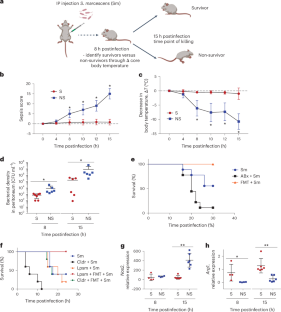Enterobactin inhibits microbiota-dependent activation of AhR to promote bacterial sepsis in mice
IF 20.5
1区 生物学
Q1 MICROBIOLOGY
引用次数: 0
Abstract
Sepsis is a major cause of morbidity and mortality, but our understanding of the mechanisms underlying survival or susceptibility is limited. Here, as pathogens often subvert host defence mechanisms, we hypothesized that this might influence the outcome of sepsis. We used microbiota analysis, faecal microbiota transplantation, antibiotic treatment and caecal metabolite analysis to show that gut-microbiota-derived tryptophan metabolites including indoles increased host survival in a mouse model of Serratia marcescens sepsis. Infection in macrophage-specific aryl hydrocarbon receptor (AhR) knockout mice revealed that AhR activation induced transcriptional reprogramming in macrophages and increased bacterial clearance and host survival. However, culture supernatants from multiple bacterial pathogens inhibited AhR activation in vitro. We showed that the secreted siderophore, enterobactin, inhibited AhR activation in vitro and increased sepsis mortality in vivo. By contrast, oral or systemic tryptophan supplementation increased survival. These findings show that sepsis survival depends upon the interplay between pathogen inhibition and the activation of AhR by a microbiota-derived metabolite. Bacterial pathogens produce enterobactin, which suppresses microbiota-derived indole activation of Ahr in macrophages to inhibit bacterial clearance and increase the severity of bacterial sepsis.


肠obactin抑制微生物依赖的AhR激活,促进小鼠细菌性败血症
脓毒症是发病率和死亡率的主要原因,但我们对其生存或易感性的机制了解有限。在这里,由于病原体经常破坏宿主的防御机制,我们假设这可能会影响败血症的结果。我们使用微生物群分析、粪便微生物群移植、抗生素治疗和盲肠代谢物分析表明,肠道微生物来源的色氨酸代谢物包括吲哚可提高粘质沙雷氏菌脓毒症小鼠模型的宿主存活率。巨噬细胞特异性芳烃受体(AhR)敲除小鼠感染后发现,AhR激活诱导巨噬细胞转录重编程,增加细菌清除率和宿主存活率。然而,来自多种细菌病原体的培养上清液在体外抑制AhR的激活。我们发现分泌的铁载体肠杆菌蛋白在体外抑制AhR的激活,并在体内增加败血症死亡率。相比之下,口服或全身补充色氨酸可提高生存率。这些发现表明,脓毒症的存活取决于病原体抑制和微生物衍生代谢物激活AhR之间的相互作用。
本文章由计算机程序翻译,如有差异,请以英文原文为准。
求助全文
约1分钟内获得全文
求助全文
来源期刊

Nature Microbiology
Immunology and Microbiology-Microbiology
CiteScore
44.40
自引率
1.10%
发文量
226
期刊介绍:
Nature Microbiology aims to cover a comprehensive range of topics related to microorganisms. This includes:
Evolution: The journal is interested in exploring the evolutionary aspects of microorganisms. This may include research on their genetic diversity, adaptation, and speciation over time.
Physiology and cell biology: Nature Microbiology seeks to understand the functions and characteristics of microorganisms at the cellular and physiological levels. This may involve studying their metabolism, growth patterns, and cellular processes.
Interactions: The journal focuses on the interactions microorganisms have with each other, as well as their interactions with hosts or the environment. This encompasses investigations into microbial communities, symbiotic relationships, and microbial responses to different environments.
Societal significance: Nature Microbiology recognizes the societal impact of microorganisms and welcomes studies that explore their practical applications. This may include research on microbial diseases, biotechnology, or environmental remediation.
In summary, Nature Microbiology is interested in research related to the evolution, physiology and cell biology of microorganisms, their interactions, and their societal relevance.
 求助内容:
求助内容: 应助结果提醒方式:
应助结果提醒方式:


